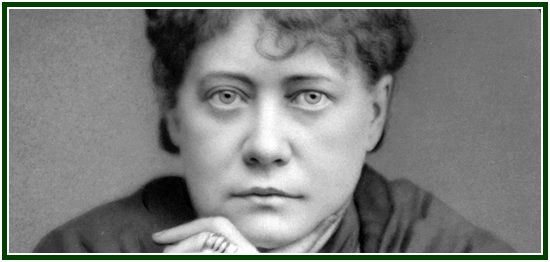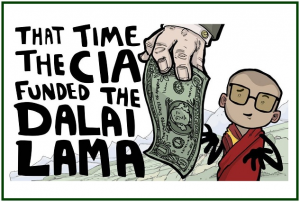
The Treason Against Helena
Blavatsky Started in the 1880s
Carlos Cardoso Aveline

HPB and Henry S. Olcott. A Master of the Wisdom clarified:
Olcott’s failure was due to his being afraid of defending the Truth.
During the 19th century, Christianity was used as a colonialist spearhead to reduce the strength of India’s traditional religious and philosophical culture, and to consolidate British domination in that country.
As soon as the theosophical movement gained strength and influence by showing the value of Eastern wisdom, the attacks of Christian missionaries against Helena Blavatsky and Theosophy were started and acquired momentum. In 1884-1885, the anti-Theosophical campaign began to include tactics such as bribery, infiltration of agents in the movement and false accusations with large media coverage.
Confronting this circumstance, the Theosophists located in Adyar – the international headquarters of the Theosophical Society – felt intimidated and got frightened. They lacked courage. With some exceptions, they stopped defending the main founder of the movement.
Few among them had understood one basic fact:
Every aspirant to wisdom is attacked and tested on the moral plane, and this happens in the exact measure of his efforts to elevate himself on the spiritual plane. The learner’s integrity, his ability to be relentlessly honest with himself and others, is the only foundation upon which the soul-learning can take place.
Attacked in many ways, defended by a minority, Helena Blavatsky fell seriously ill. Yet her mission could not end at that moment. Her health was essentially restored by a Master of the Wisdom. She traveled to Europe, she finished recovering and devoted herself to writing “The Secret Doctrine”.
With the attacks of 1884-1885, a certain magnetic bond was broken on several fronts. Let’s look at some examples:
* Eastern Masters stopped writing letters to lay disciples. Frustrated, Alfred P. Sinnett distances himself from Blavatsky. Unable to accept the fact that the Masters had decided to keep quiet, Sinnett falls into imaginary mediumistic conversations with false Masters.
* Damodar Mavalankar, an advanced disciple and a close assistant to HPB, reaches the limit of his human endurance. With his health in danger, he withdraws from Adyar and, being invited by his instructor, decides to live in an Ashram of the Masters.
* Subba Row, another advanced disciple, was defeated by himself. Falling into the magnetic circle of disorientation, he loses his good sense and dies still young.
* Charles Leadbeater, who had been accepted as a disciple on probation, fails the test. Later, when the Esoteric School is organized from England, Leadbeater is not admitted to it by H.P.B. This fact in itself demonstrates that Leadbeater failed as a disciple. Instead of joining the Esoteric School, he became part of a rival group in London, led by Alfred Sinnett, who had already fallen into the world of false clairvoyance.
* The majority of theosophists living in India loses the focus. Starting from 1887, HPB resumes her work with intensity – from her office in London.
By studying the documents of the time, widely published today, we see therefore that the betrayal of the founder of the movement began seven years before her death, and “flourished” under the leadership of Annie Besant, after HPB abandoned physical life in 1891.
People were unprepared for the pursuit of wisdom.
With a few exceptions, the collective bridge between the Eastern masters and the Western civilization was failing. The Karmic doors to the great world wars were thus opened. The foundations of the moral decay and lack of common sense that would reign in the 20th century and the first decades of the 21st century were established.
In an 1885 letter to Alfred P. Sinnett, when Sinnett had not yet turned against her, H.P.B. describes the way in which the Adyar theosophists systematically refuse to defend her, or to defend the truth, and exclaims:
“Why should my best friends allow me to be so vilified!” [1]
In the same letter, two pages later, she adds with the frankness of someone born under the sign of Leo, who trusts truth and the light of the Sun:
“While my enemies tear me to pieces the Adyar people play ‘hide and seek’ – they pretend to be dead – Oh! the poor wretched cowards!! (….) I tell you I suffer more from these theosophical traitors than from the Coulomb, Patterson, or even the S.P.R.”. [2]
Perhaps she was warning Sinnett about the moral danger he would face if he followed the same direction. Fortunately, Sinnett never attacked her personally. He lost the track, he became disoriented, but remained innerly loyal to the theosophical ideals.
On June 16, 1885, Blavatsky wrote in a letter to Francesca Arundale:
“And, oh dear, how many traitors and Judases of all colours and shades we have in the very heart of the Society. Ambition is a terrible adviser!” [3]
HPB must have known what she was saying by using this emphatic language. She suffered a moral and emotional crucifixion during her life.
One century later, in 1986, the Society for Psychical Research (S.P.R.), which had accused her of fraud, finally admitted the facts, albeit indirectly. HPB was honest and innocent: the fraud was in the accusations of the S.P.R. against her.
During the first half of the 21st century, a small number of Theosophists understand the unavoidably central character of ethics and honesty, as the foundations of any philosophical knowledge. It is reasonable to expect that this number will grow and make room for a better contact between good-willing people and the sources of higher knowledge.
A Few Words on Olcott
One should also examine the attitude adopted by the founding president of the Theosophical Society, Henry Olcott, in the face of these challenges. And his attitude wasn’t brilliant. Confronted by the anti-theosophical campaign, the president was guided by fear. He left aside the truth and abandoned the idea of being loyal.
Referring to Olcott, the Master told Blavatsky:
“…He showed moral weakness, as much as physical weakness…”.
“…The Society has liberated itself from our grasp and influence and we have let it go – we make no unwilling slaves. He says he has saved it? He saved its body, but he allowed through sheer fear, to its soul to escape, and it is now a soulless corpse, a machine run so far well enough, but which will fall to pieces when he is gone.” [4]
These words were annotated by HPB and, thanks to C. Jinarajadasa, are now part of the Letters from the Masters. In the future, they should be given their due importance.
Commenting on the fact that Olcott opened the doors of the theosophical movement to the enemies of truth, Blavatsky declared in 1885:
“Dead or alive, I will never forgive Col. Olcott…”. [5]
NOTES:
[1] “The Letters of H.P. Blavatsky to A. P. Sinnett”, Theosophical University Press, Pasadena, California, 1973, 404 pp., see Letter XLVI, p. 112.
[2] “The Letters of H.P. Blavatsky to A. P. Sinnett”, Letter XLVI, p. 114. On treason and lies coming from Adyar, see also the article “Why I Do Not Return to India”, by HPB.
[3] “The Letters of H. P. Blavatsky to A. P. Sinnett”, Letter XLII, p. 95. No doubt, subconscious ambition is one of the factors that stimulate cowards not to support leaders, when leaders are unjustly attacked. There is in this also a significant amount of ingratitude.
[4] “Letters From the Masters of the Wisdom – First Series”, compiled and edited by C. Jinarajadasa, fourth edition, TPH, India, 1948, Letter 47, pp. 113-114. The entire Letter 47 describes the failure of Olcott, which later on was led to its ultimate consequences by his “political” successor, Ms. Annie Besant.
[5] “Collected Writings”, H. P. Blavatsky, TPH, USA, volume VI, p. 326.
000
The above article was published as an independent item on the websites of the Independent Lodge of Theosophists on 11 October 2024. It is also part of the June 2023 edition of “The Aquarian Theosophist”, pp. 05-08. It was translated by CCA from the original Portuguese language article “HPB e os Pobres Covardes em Adyar”.
000
Read more:
000

Helena Blavatsky (photo) wrote these revealing words: “Deserve, then desire”.
000
